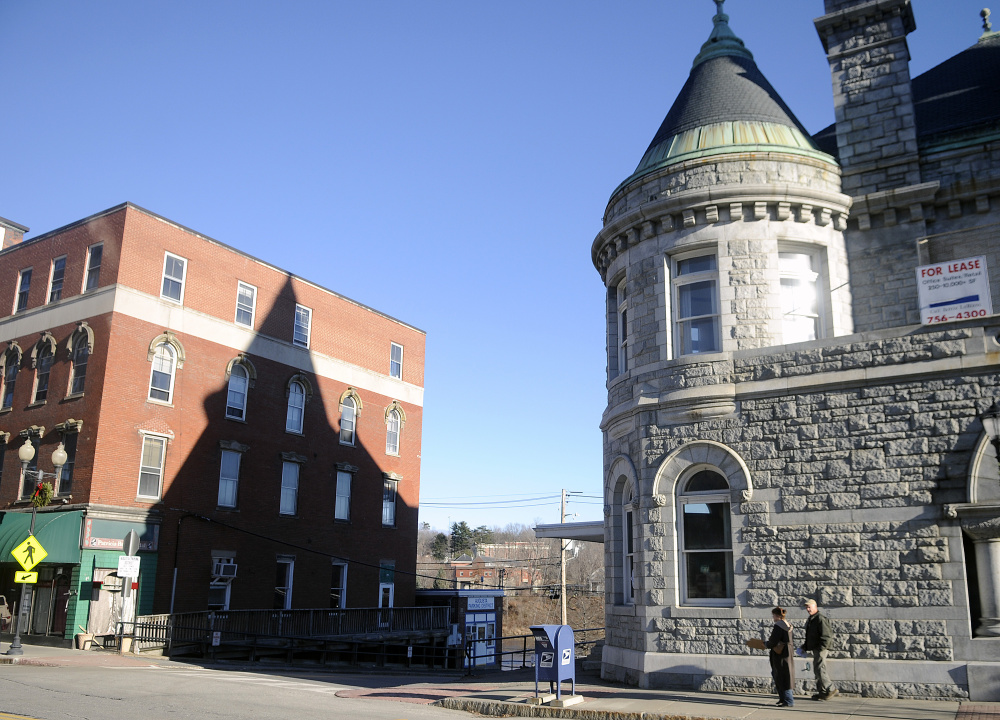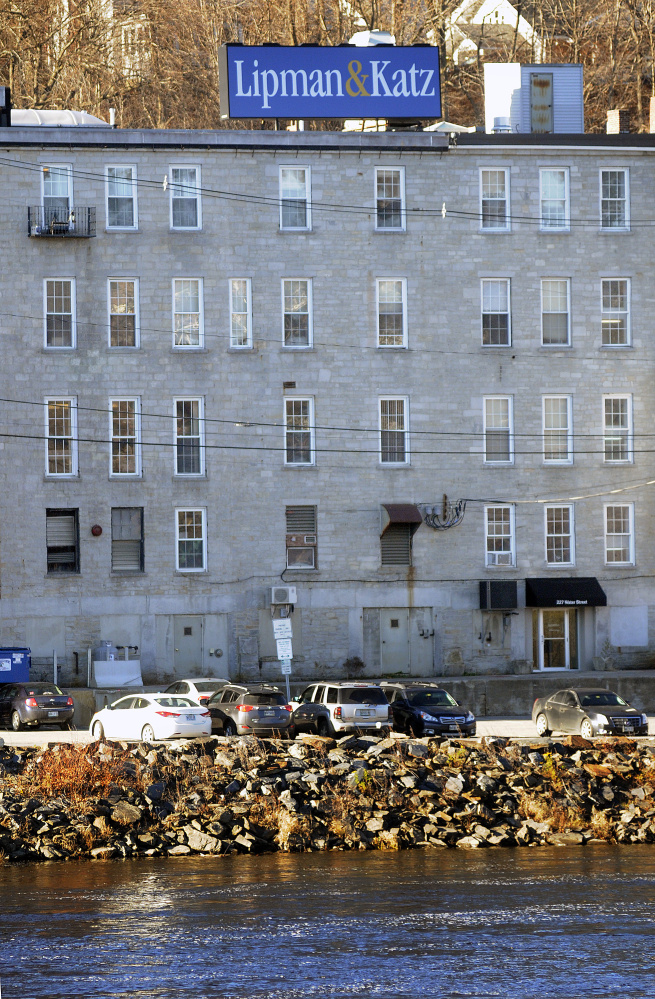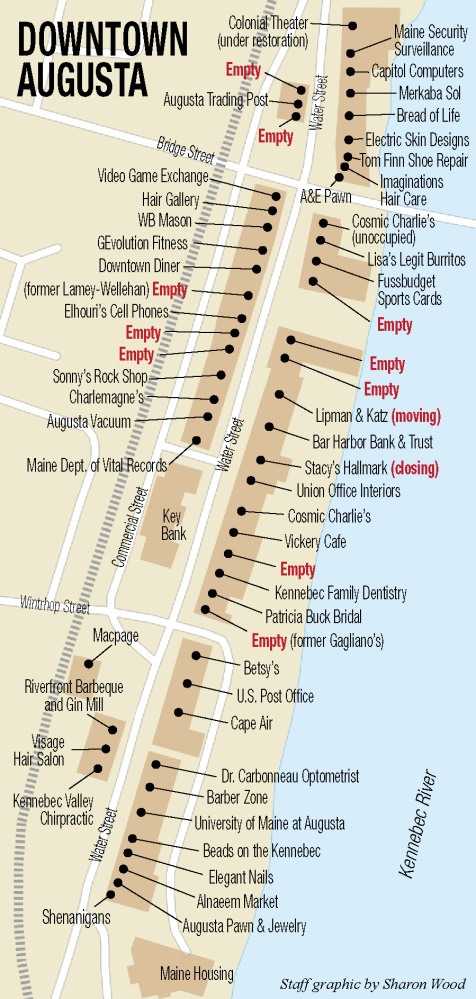AUGUSTA — The downtown area in the heart of the state capital has seen significant change over the past few decades.
Now Water Street is in flux again as some larger employers move farther from the heart of downtown, and proprietors of some smaller stores work to rekindle interest in shopping downtown.
Within the past year or so, a number of businesses have closed or announced that they intended to close or relocate soon. Among them is Lipman & Katz, a major law firm, which announced plans to relocate to a new site near the Augusta Civic Center, and which has Sen. Roger Katz, R-Augusta, as one of the named partners.
Katz had championed the downtown when he was the city’s mayor from 2006 to 2010.
“This is a bittersweet move,” Katz said Friday. “Our space requirements changed, and with the need to be more accessible to some of our statewide clients, it made sense to make the move.” He said the firm searched for other potential locations downtown but were unable to find a suitable one.
For him personally, he added, it will be difficult to move. “I grew up downtown,” he said. “Part of my heart is there and will remain there.”
Tom LaCasse, who has operated Tom Finn’s Shoe Repair on Water Street for the past 30 years, said “transition” is his preferred term for the current Water Street phase.
“You’re going from big department stores to much more niche stores in downtown here and downtowns everywhere,” he said. “Look at downtowns that do well and all the little niche stores. I think that’s the only way you can make it.”
“Our need is for advertising and publicity,” said Linda LaCroix, owner of Beads on the Kennebec. “We more need help from the city and the chamber to market what we’ve got here and help us to grow.”
Augusta Mayor David Rollins agrees that the downtown is in transition with the cluster of recent moves, but he’s betting that a new showpiece will help counter that.
“I believe the most critical thing to bring people back downtown will be the restoration of the Colonial Theater,” Rollins said of the dilapidated 1913 building on Water Street that ceased theater operations in 1969. “I used to think it would be nice to have the Colonial Theater back; I now think it’s essential.”
Katz said he remains bullish on prospects for downtown Augusta.
“I’m still a very strong advocate for downtown,” he said. “I think downtown’s get an incredibly bright future. The increase in housing is really exciting, and those upper floors of these buildings have been vacant for decades, and they’re now filling in. A certain amount of turnover in buildings is part of life. We’re definitely moving in the right direction.”
Even so, other recent business departures from downtown have added up:
• The owners of Stacy’s Hallmark, a longtime retail anchor downtown, announced they are closing as of Dec. 31, and the 241-249 Water St. building is being sold to developer Tobias Parkhurst.
• Gagliano’s Italian Bistro, 287 Water St., was shuttered after code violations were found in the building, and then the owners made the closure permanent.
• Kennebec Pediatrics at 263 Water St. and the offices of MaineGeneral WIC and the Edmund N. Ervin Pediatric Center, all part of MaineGeneral Health, moved in July to the Ballard Center, at 6 East Chestnut St., the former MaineGeneral Medical Center site.
• Molina Medicaid Solutions, part of Molina Healthcare, moved from the former JC Penney building on Water Street and consolidated its offices at Commerce Drive.
• Cozy Cottage moved out of 177 Water St., but the adjacent A&E Pawn expanded into it.
The outflow of businesses has left some storefronts vacant even as developers convert upper floors into upscale apartments. Amid all the transition or because of it, small business merchants, including LaCroix, count on their unique offerings to attract people to the downtown.
“My customers are beaders,” she said. “They come from all over the state.” And she’s not shy about forwarding them to other Water Street local businesses when they ask about where to do more shopping or where to eat.
“Stop up the street and see Betsy’s consignment boutique,” she said. “Go to Lisa’s Legit Burritos or Riverfront Barbecue for lunch.”
It’s all part of mutual support effort.
“We play a game,” said David Hopkins, one of the owners of Merkaba Sol, a healing arts and retail store at 153 Water St. “If you send three people my way, I’ll do something for you.”
LaCroix and Hopkins and some of the other merchants put together a Downtown EXPO,which hosted an outdoor fashion show in the summer and later an Autumn Fest, both designed to attract shoppers and interest downtown.
Hopkins opened his business about five years ago. “My parents thought I was crazy,” he said, “but it took off for us.”
He never doubted. “We just knew that our business would connect with people down here,” he said. “People needed hope, vision.”
He is also part of the Augusta Downtown Alliance, a volunteer group aimed at developing a thriving downtown. It has selected three finalists for the post of downtown manager, replacing Steve Pecukonis, who left recently after two years as the group’s first executive director. The post is supported by the city, donations and business commitments.
“Water Street has its issues, and we’re trying to change people’s perceptions of it,” Hopkins said.
“It’s a jewel in the rough. I really think we can do something here.” He credits developers Tobias and Richard Parkhurst and efforts to restore the 1913 Colonial Theater property at 139 Water St., among other things.
“Don’t forget the little guys, which is what America was made of,” Hopkins said.
Karen Hatch, owner of the 333-339 Water St. building that today houses Beads on the Kennebec and a number of other businesses, said her property has been occupied fully for almost the entire 15 years she has owned it, but she too would like to see more assistance for downtown property owners from the city, perhaps though a revolving loan fund that could be used for improvements.
Rollins, the Augusta mayor, also credits the efforts of the Downtown Alliance. “The city stands beside them with all the tools we can muster up,” Rollins said.
Among those is a downtown tax increment financing district, which would take money generated from that district and transferred from other districts to support infrastructure improvements, he said, as well as a move to create a downtown historic district inside a proposed Westside Historic District.
“That would open the door to being a certified local government and make us eligible for preservation grants,” he said.
Betty Adams — 621-5631
Twitter: @betadams
Send questions/comments to the editors.







